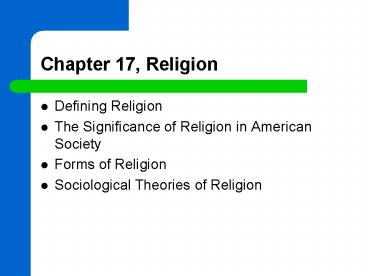Chapter 17, Religion - PowerPoint PPT Presentation
1 / 23
Title:
Chapter 17, Religion
Description:
Chapter 17, Religion Defining Religion The Significance of Religion in American Society Forms of Religion Sociological Theories of Religion – PowerPoint PPT presentation
Number of Views:106
Avg rating:3.0/5.0
Title: Chapter 17, Religion
1
Chapter 17, Religion
- Defining Religion
- The Significance of Religion in American Society
- Forms of Religion
- Sociological Theories of Religion
2
Chapter 17, Religion
- Globalization World Religions and Diversity
- Religious Organizations
- Becoming Religious
- Social and Political Attitudes The Impact of
Religion - Religion and Social Change
3
Six Defining Elements of Religion
- Religion is institutionalized.
- Religion is a feature of groups.
- Religions are based on beliefs that are
considered sacred, as distinguished from profane.
4
Six Defining Elements of Religion
- Religion establishes values and moral
proscriptions for behavior. - Religion establishes norms for behavior.
- Religion provides answers to questions of
ultimate meaning, as distinguished from secular
beliefs.
5
Religious Identification in the U.S.
- Protestant 57
- Catholic 26
- None/Undesignated 12
- Jewish 2
- Mormon 1
- Orthodox Church 1
- Other 2
6
Durkheim The Functions of Religion
- Religion is functional for society
- Reaffirms the social bonds between people.
- Creates social cohesion and integration through
religious rituals. - Binds individuals to society by establishing a
collective consciousness.
7
Weber The Protestant Ethic and the Spirit of
Capitalism
- The Protestant faith supported the development of
Capitalism. - Material wealth meant one was favored by God,
motivating Protestants to work to confirm their
salvation. - Value judgments about those who havent succeeded
can be traced to influence of religion.
8
Marx Religion, Social Conflict, and Oppression
- Religion legitimates the social order and
supports the ideas of the ruling class. - Oppressed people develop religion to soothe their
distress and it prevents them from rising up
against oppression. - Religion can be the basis for social change or
social continuity.
9
Religions of the World
- Religions of the World
- Christianity 1.9 billion
- Islam 1.2 billion
- Hindus 761 million
- Chinese folk-religionists 379 million
- Buddhists 363 million
- Jewish 14 million
10
Christianity
- Dominant religion worldwide and in the U.S.
- Two categories of Protestants mainline and
conservative fundamentalists. - Roman Catholics adhere to a hierarchical
religious system, with values and codes of
behavior mandated by the Pope.
11
Judaism
- More than 40 of the world's Jewish population
lives in the U.S. - The Jewish faith is more than 4,000 years old.
- 19 of Jewish Americans attend services in a
typical week, but most observe the high holidays
and bar/s mitzvahs.
12
Judaism
- Jews are both a religious group and a minority
group. - The bond of solidarity among the Jewish people is
strengthened by their history of persecution and
by continuing prejudice against them.
13
Islam
- Muslims believe that Islam is the word of God,
revealed in the prophet Muhammad. - Highly traditional Islamic fundamentalists adhere
strictly to the word of the Koran. - Muslims have a patriarchal world view with women
being denied the freedoms men enjoy.
14
Hinduism
- Karma is the principle that sees all human action
as having spiritual consequences. - Deeply linked to the caste system in India.
- Gandhi used Hindu principles of justice, honesty,
and courage to guide one of the most important
independence movements in the world.
15
Buddhism
- Buddhism encourages its followers to pursue
spiritual transformation and enlightenment to
relive themselves of worldly suffering. - Involves a concept of birth and rebirth through
reincarnation. - Many New Age spiritual groups in Western society
have adopted its focus on meditation.
16
Confucianism
- A complex religious system originating in China,
Confucianism promotes a disciplined way of life. - Confucians follow the principles of Confucius, a
leader who promoted certain moral practices. - The expression of goodness and social unity is an
important principle, there is not a particular
god or set of disciples Confucians follow.
17
Diversity and Religious Belief
- In general, those most likely to be unaffiliated
with any church are young, White, well-educated,
non-Southern men who move frequently. - The most religiously committed are older, African
American, less educated, Southern women who are
geographically stable.
18
Three Types of Religious Organizations
- Churches - formal organizations that are seen by
society, as the primary and legitimate religious
institutions. - Sects - groups that have broken off from an
established church. - Cults - religious groups devoted to a specific
cause or a leader with charisma.
19
Becoming Religious
- People learn religious faith through religious
socialization. - The family is one of the main sources of
religious socialization. - Religious conversion involves a dramatic
transformation of religious identity.
20
Religious Conversion
- A social process in three phases
- Disruption in previous life experience leading to
withdrawal and some loss of autonomy. - Creation of an emotional bond with group members
and a weakening of former bonds. - Period of intense interaction with the new group.
21
Religion Social and Political Attitudes
- Racial Prejudice. People who belong to religious
organizations that encourage intolerance are
likely to be racially prejudiced. - Homophobia is linked to religious orientations
that promote intolerance of any kind. - Anti-Semitism is one of the worlds most
persistent forms of prejudice.
22
The New Religious Conservatism
- Fundamentalists whose unity is facilitated
through Christian religious media, have - Fueled anti-abortion activism.
- Revived the effort to teach creationism.
- Campaigned against womens rights and gay and
lesbian rights, while supporting family values.
23
Changes in Religious Behavior
- Enormous growth in conservative religious groups.
- Evangelical groups have been highly influential
though their use of electronic media. - Religion has had an important part in the civil
rights movement and feminism.































